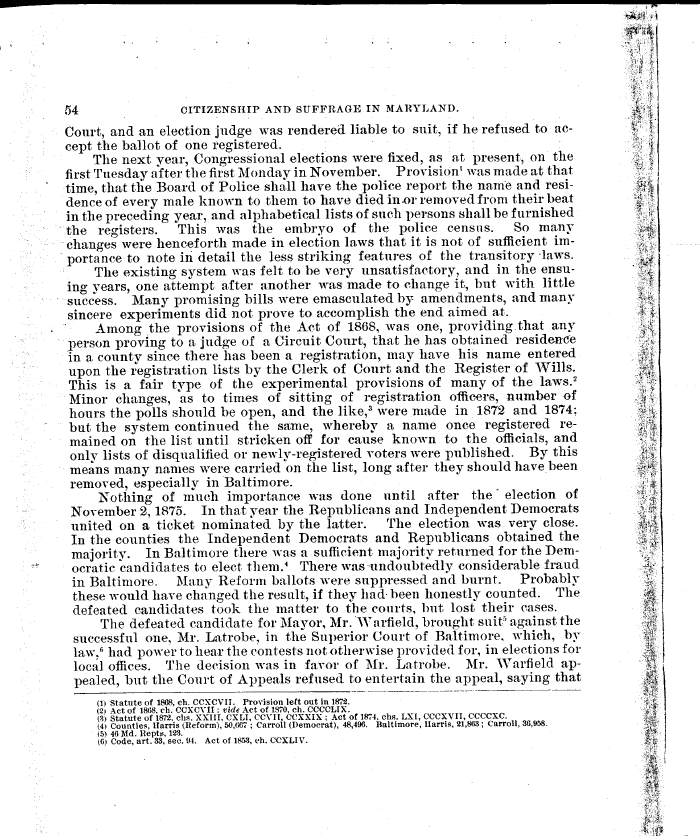|
CITIZENSHIP AND SUFFRAGE. IN MARYLAND.
Court, and an election judge was rendered liable to suit, if he refused to
ac-
cept the ballot of one registered.
The next year, Congressional elections were fixed, is ,it present, on the
first Tuesday after the first Monday in November. Provision' was made at
that
time, that the Board of Police shall have the police report the nalrie and
resi-
dence of every male known to them to have died in-or removed from their beat
in the preceding year, and alphabetical lists of such persons shall be
furnished
the registers. This was the embryo of the police census. So many
changes were henceforth made in election laws that it is not of sufficient
im-
portance to note in detail the less striking features of the transitory
-laws.
The existing system was felt to be very unsatisfactory, and in the ensu-
ing years, one attempt after another was made to change it, but with little
success. Many promising bills were emasculated by amendments, and many
sincere experiments did not prove to accomplish the end aimed at.
Among the provisions of the Act of 1868, was one, providing.that any
person proving to a judge of a Circuit Court, that he has obtained residen6e
in a county since there has been a registration, may have his name entered
upon the registration lists by the Clerk of Court and the Register of Wills.
This is a fair type of the experimental provisions of many of the laws.2
Minor changes, as to times of sitting of registration officers, number of
hours the polls should be open, and the like,' were made in 1872 and 1874;
but the system continued the same, whereby a name once registered re-
mained on the list until stricken off for cause known to the officials, and
only lists of disqualified or newly-registered voters were published. By
this
means many names were carried on the list, long after they should have been
removed, especially in Baltimore.
Nothing of much importance was done until after the' election of
November 2, 187. In that year the Republicans and Independent Democrats
united on a ticket nominated by the latter. The election was very close.
In the counties the Independent Democrats and Republicans obtained the
majority. In Baltimore there was a sufficient majority returned for the Dem-
ocratic candidates to elect. them.' There was-undoubtedly considerable fraud
in Baltimore. Many Reform ballots were suppressed and burnt. Probably
these would have changed the result, if they had- been honestly counted. The
defeated candidates took the matter to the courts, but lost their cases.
The defeated candidate for AIavor, Mr. AVarfield, brought snit' against the
successful one, Mr. Latrobe, in the Superior Court of Baltimore, which, by
law, had power to hear the contests not otherwise provided for, in
elections for
local offices. The decision was in favor of 11r. Latrobe. Air. W'arfield ap-
pealed, but the Court of Appeals refused to entertain the appeal, saying
that
(1) Statute of 1868, ch. CCSCVII. Provision left out in 1812.
(2) Act of 1868, ch. CCKCVII : vide Act of 1870, eh. CCCCLI%.
(3> Statute of 1872, ch,;. X\III, CSLI, CCVIf, C(:IiRIa ; Act of 1874, chs.
LSI, CCCXVII, CCCCZC.
(91 Counties, Harris (Reform), 50,(iG7 ; Carroll (Democrat), 98,496.
Baltimore, Harris, 21,803; Carroll, 36,958.
(5) 4611Id. Repts, 128.
(6) Code, art. 33, sec. yt. Act of 185.3, ch. CCbLIV.
|

